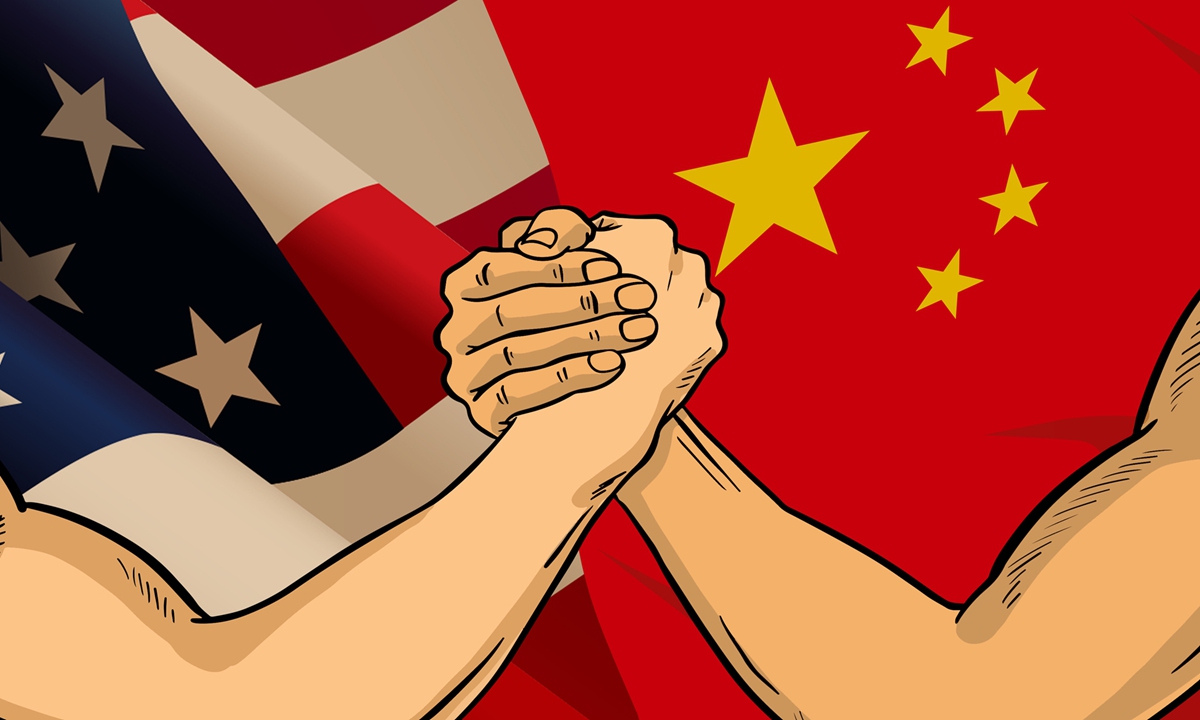US’ China relations fact sheet may ‘pave way’ for the release of Biden’s review of China policy in ‘late May or early June’

China-US relations Photo: GT
The China-US relations fact sheet recently published by the US Department of State could be seen as Washington's factual overview of its China strategy, and may pave the way for the release of the Biden administration's review of the US' policy toward China, which may be released at the end of this month or early June, Chinese observers said.
Its ambiguity and clichés showed that the Biden administration has not yet formed a clear China policy, Chinese observers said.
The US Department of State published the US relations with China under the section of bilateral relations fact sheet on Wednesday, in which it positioned the frame of China relations as "strategic competition," a label US President Joe Biden adopted from the Trump administration, and says it will address relations with China from a "position of strength." The US hopes to ally with partners to "push back against China's abusive and coercive economic practices," and believes that China has become increasingly "assertive" in multilateral organizations, according to the fact sheet.
Among the 200 items in the bilateral relations fact sheet of the US Department of State, the pages of 46 countries and regions including China were published this year. The relations with China were its latest release. Most of this year's published pages were about the US' relations with countries in Latin America and Africa, and most of the pages involving US' allies including Australia, UK, Canada and Japan were published before Biden took office.
Chinese analysts on US studies said that the fact sheet of its relations with China might just be a routine update of the US Department of State's general bilateral relations with 200 some countries and regions as listed on its website, but it may also serve as a preparation for the US' review on China policy.
"It's interesting that the Biden government did not release its relations with most of its close allies, but released the relations with China," Yuan Zheng, deputy director of the Institute of American Studies at the Chinese Academy of Social Sciences, told the Global Times on Friday, noting that it may pave way for the results of the US' review of China policy.
Biden in February announced the creation of a task force to review US policy toward China, and the task force, consisting of up to 15 civilian and uniformed officials, has been given four months to come up with recommendations on US military strategy toward China, technology, and alliances and bilateral defense relations with Beijing, according to US Department of Defense.
But what it said was full of clichés that have been said repeatedly since Biden took office in January, Yuan said.
There was nothing new in the fact sheet, and its ambiguity revealed that the US is still confused about its China strategy, Lü Xiang, a research fellow on US studies at the Chinese Academy of Social Sciences in Beijing, told the Global Times.
For example, the fact sheet mentioned cooperation with China on climate change and the global health crisis, but so far there were no practical actions from the US, he said.
The US' China policy may be clearer in the second half of this year, he said.
The US' uncertainty of China policy could also be reflected from the fact sheet in which it said it will address relations with China from a "position of strength," but the US is unclear about its own strengths, Lü said.
What it said in the fact sheet indicated that it will suppress China with its strength, but it also needs to rebuild its own strength.
The US is uncertain about how much help its allies will provide and how strong its own strength is as it has plunged into an unprecedented crisis with pressures of economic recovery and deepened social conflicts, Lü said.
Chinese observers believed that unlike Trump which pushed bilateral ties on the verge of war, Biden clearly knows the "red lines" in dealing with China and its China policy will be more predictable, transparent and with less frequent changes.
But we need to be alert on whether Biden will touch upon China's core interests, such as on the Taiwan question and issues related to the South China Sea and Xinjiang, Yuan warned.
The US has been using the disguise of its "One-China policy" to deepen its economic, military and other cooperation with the island of Taiwan, which actually "emptied" the policy, Yuan said.
China needs to adopt a scenario management strategy toward ties with the US, and China has fully prepared, observers said.



